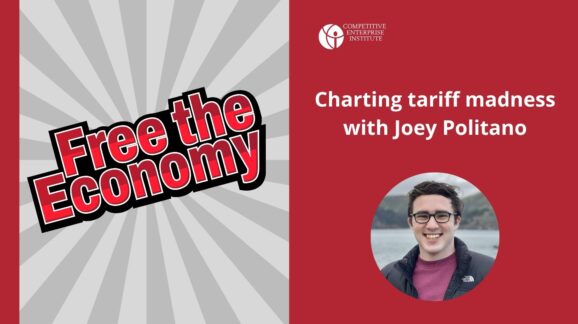There are two main areas in which Congress can enact meaningful reform. The first is to rein in regulatory guidance documents, which we refer to as “regulatory dark matter,” whereby agencies regulate through Federal Register notices, guidance documents, and other means outside standard rulemaking procedure. The second is to enact a series of reforms to increase agency transparency and accountability of all regulation and guidance. These include annual regulatory report cards for rulemaking agencies and regulatory cost estimates from the Office of Management and Budget for more than just a small subset of rules.
In 2019, President Trump signed two executive orders aimed at stopping the practice of agencies using guidance documents to effectively implement policy without going through the legally required notice and comment process.
Featured Posts

Blog
An executive order to make freedom mandatory
The White House Office of Management and Budget’s (OMB) new “Streamlining the Review of Regulatory Actions” memorandum signals a potentially transformative shift in Washington’s…

Blog
Free the Economy podcast: Charting tariff madness with Joey Politano
In this week’s episode we talk about changes in consumer credit, disappearing fast-food jobs in California, and six things the climate movement…

Forbes
Regulation Renovation: The Executive Order To Make Deregulation Permanent
The White House Office of Management and Budget’s new Streamlining the Review of Regulatory Actions memorandum signals a preferential stance toward deregulation, urging…
Search Posts
Op-Eds
Sarbanes-Oxley Challenge Is Rooted in Law’s Flaw
Re: Jane Bryant Quinn’s column, “Accounting Cleanup Board Is Facing a Gutting’’ (July 16): In her attack on our constitutional challenge to the Sarbanes-Oxley Act…
Newsletter
Global Warming Allergies, Change at the SEC and Accounting for the Cost of Government
Global warming gets blamed for an increase in allergies. Paul Atkins steps down as Commissioner of the U.S. Securities and Exchange Commission. Taxpayer advocates observe…
Op-Eds
A ‘Hidden Tax’ Of Rules Hits Economy
Regulatory compliance now costs of $1.16 trillion, higher than Canada's entire 2004 GDP—that's a knock-out blow to the economy…
News Release
SEC Commissioner Earns Praise for Service to Investors, Entrepreneurs
On Aug. 1, Paul S. Atkins ended his six-year term as Commissioner of the U.S. Securities and Exchange Commission. Competitive Enterprise Institute President Fred…
Newsletter
Costs of Regulation, FDA Reform and Global Warming Skepticism
The House Small Business Committee hears testimony on the costs of federal regulation. Patient advocates urge lawmakers to pass legislation forcing the Food and Drug…
Newsletter
Whole Foods Merger, Ethanol’s Impact and Health Savings Accounts
A federal court calls into question the recent merger of Whole Foods and Wild Oats natural food stores. South Asian leaders meet to discuss food…
Staff & Scholars

Clyde Wayne Crews
Fred L. Smith Fellow in Regulatory Studies
- Business and Government
- Consumer Freedom
- Deregulation

Ryan Young
Senior Economist
- Antitrust
- Business and Government
- Regulatory Reform

Fred L. Smith, Jr.
Founder; Chairman Emeritus
- Automobiles and Roads
- Aviation
- Business and Government

Sam Kazman
Counsel Emeritus
- Antitrust
- Automobiles and Roads
- Banking and Finance

Marlo Lewis, Jr.
Senior Fellow
- Climate
- Energy
- Energy and Environment